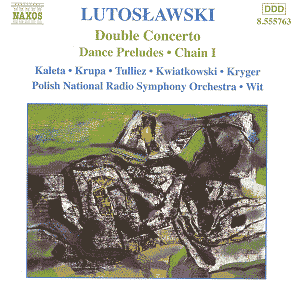Lutosławski
was one of the most important composers
of the second half of the 20th century.
His early works were relatively conservative
in style, often making use of folk material.
However, following the inauguration
in 1956 of the Warsaw Autumn Festival,
one of the world's leading festivals
of contemporary music, he embarked upon
a new phase in his artistic development.
This coincided with Poland making renewed
contact with the prominent forces of
the musical life of the West.
Lutosławski
gained an international reputation as
a distinctly modernist voice with a
clearly individual personality. For
more than thirty years from that time
he produced a succession of masterpieces
for the world's leading soloists and
orchestras.
This
CD is labeled as Volume 8 in the Naxos
Lutosławski series, and therefore
it may be the last of these issues.
The reason for this equivocation is
that this disc seems to gather many
shorter pieces. It may be possible that
other fragments may lurk awaiting performance
and recording.
Be
that as it may, this particular combination
is imaginatively put together, well
documented and thoroughly enjoyable.
Over the years Lutosławski wrote
many pieces described as ‘children’s
songs’, and eight of these are collected
here. The earlier pair have a distinctively
‘folksy style’, at once direct and appealing,
with Urszula Kryger an appropriately
fresh-voiced soloist. The later songs
are no less attractive, and are equally
well sung if somewhat more sophisticated
in approach. There is pointed wit in
the lively songs, but the pick of them
all is probably ‘The Brook’, which generates
a richly lyrical intensity.
Those
who know the Dance Preludes in the version
for clarinet and piano can rest assured
that Lutosławski’s skilful orchestral
arrangement does not eclipse the original
version, even when it is as well played
as it is here. The brief Grave, subtitled
Metamorphoses for cello and string
orchestra, is rather densely scored,
which reflects its intensely emotional
nature. This is a short piece of less
than six minutes’ duration, but its
character makes it seem bigger than
that.
It
was for Heinz and Ursula Holliger that
Lutosławski composed his Double
Concerto for oboe, harp and chamber
orchestra, surely one of his best pieces
for mixed ensemble. Few modern composers
have been as resourceful in adapting
to the demands of particular instrumental
combinations, so this piece can rank
as a classic of the later 20th
century. The recording, like the performance,
captures the music in keen profile.
Another
masterly score in this collection is
Chain I, composed for the London
Sinfonietta in 1983. This is a particularly
vibrant and distinctive score, and challenging
too. Although the recorded sound lacks
a little in depth it is more than acceptable,
while the performance, like the others
in this collection conducted by the
admirable Antoni Wit, is vital and committed.
Terry Barfoot
see
also reviews by Tony Haywood and Colin
Clarke
